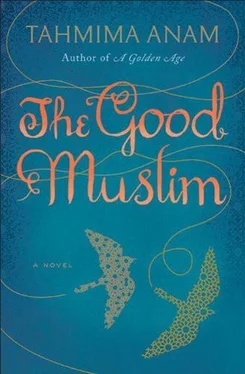‘Why, child, why do you have to be so intolerant?’ She puts her face close to her daughter’s and whispers, tender, ‘He’s going to pray, he’s going to go to the mosque on Fridays. Don’t be so frightened of it. It’s only religion.’
Rehana was right — at first. Sohail was almost back to his old self, smiling at meals, whistling under his breath. He started to attend classes at the university, though he didn’t linger on campus or go to any of the student-union meetings. He was occasionally seen with his friends, playing cricket at Abahani Field, and in that second summer after the war, when the constitution was written and the cyclone ebbing away, Rehana told Maya it was only a slight change in Sohail, that the mother had been right about her son. He didn’t even grow a beard.
There were ripples of darker things. They heard that the Hussain boy, a few years younger than Sohail, had drowned himself. And the neighbour’s son Shahabuddin had beaten his pregnant wife because he believed she was carrying a demon child.
But most of the boys and girls were as serious and obedient as they had ever been. They attended their classes; they married and bore children and warmed milk for their parents every evening. They put their memories away as best as they could, and they wiped the traces of blood from their hands and from the hems of their saris. And Rehana rested easy, sure that her son wouldn’t take his interest too far. After all, she was the one who had given him the Book.
Cancer. Every time Dr Sattar said the word his voice dipped, until he started calling it ‘the disease’ and then, occasionally, ‘the C’. The operation was only the beginning. Rehana would need chemotherapy, powerful poisons that would kill the cancer. But they might kill her too. It was an uncertain science, the treatment often worse than the disease. Maya listened and the words went straight to her blood. She had never taken seriously the possibility that she might someday have to live without her mother. Death was something that had already happened to her; her father had died before she even knew that death was longer than sleep; later, death happened to the people she treated; she held her hand up against it every day, against dysentery and malaria and snakebites. Death had even skirted past Nazia, leaving scars on her legs but allowing her to live. She had never imagined, never seriously, that death would take something from her again.
That year the rain was everywhere. The gutters overflowed in Dhaka, and the rivers burst their banks, the Padma, the Jamuna, swallowing houses and farm animals and drowning the young rice. Maya brought Ammoo back from the hospital and paced the verandah. At night she cried into the crook of her arm. She found Sufia in her bedroom once, holding up the kerosene lamp and nodding, nodding.
The telephone girl brought Maya a message. Sister Khadija was going to hold a special Milaad for Ammoo. The upstairs women would recite, between them, the entire Qur’an and direct their blessings to Ammoo’s recovery. Would she like to come? The picture in her mind was serene, the smell of bodies mingling with the cinder waft of attar. She found herself saying yes.
The women were casually laid out, in clumps of three or four. Their heads were covered, but their hands and feet, normally gloved and socked, were visible, and busy: they carried plates of food into the room, distributed cushions, stepped purposefully around each other. Khadija embraced her warmly.
‘Sister,’ she said. ‘Please, sit down, sit here.’ The floor was cleared, a fresh cloth placed under her feet. Maya looked around and saw many faces turned towards her. ‘This is the Huzoor’s sister, Maya.’
A chorus of salaams travelled through the room. ‘Everyone knows who you are. Huzoor has spoken of you.’
A young woman approached, raven-haired, and smiled dazzlingly at Maya. The telephone girl. ‘Maya, this is Rokeya.’ Rokeya salaamed. ‘You’re a doctor?’ she said.
‘Yes, I trained in surgery.’
‘Under Sattar sir?’
‘Yes, he was my supervisor. You know him?’
‘I trained at Dhaka Medical.’
‘Really — what batch?’
‘’83.’
So she had finished her training only last year. What a waste, Maya thought; now she was waiting for her husband, probably some wrinkled old thing, to call every afternoon, laying out blankets for me and calling my brother Huzoor.
‘Let me make you a cup of tea,’ Rokeya offered, adjusting her scarf. ‘How do you take it?’
She darted away and Khadija motioned again for Maya to sit down. Then she turned to the other women and said, ‘Bismillah ir-Rahman ir-Raheem, it is time.’
Each of them pulled out a tasbi and began to recite the Kalma under her breath. The beads of stone and wood passed through their palms as they pulled the tasbi across with their thumbs. Empty bowls were passed around, and in the four corners of the room were small piles of dried beans. As soon as someone finished a cycle on her tasbi, she put a chickpea into the bowl in front of her.
Khadija sat down heavily and opened her Qur’an. She began to recite.
*
On the second day Rokeya told her that Sohail was going to make a rare appearance at the taleem. A personal sermon. Would she like to come?
When she arrived, it was already quiet, and the women were rearranging themselves around her, turning to the back of the room. They worked silently, clearing plates and lifting sheets from the floor, shaking them out, pointing, you sit there, let Sister Zayna have a cushion.
It was just like the funeral. A curtain was pulled across the room, dividing it in half. The women fitted themselves into what had become the back of the room. On the other side, footsteps, lowered voices, the sound of men filing in. Men, clearing their throats. On the women’s side, the scarves were pulled tighter, as though the very sound of their brothers on the other side warranted an extra dose of vigilance.
From beyond the partition, her own brother began to speak.
‘My brothers and sisters, Bismillah ir-Rahman ir-Raheem. I speak of the prophet Abraham, may peace and blessings be upon him. The story of Abraham is an old and sacred one. Our prophet and brother Abraham, peace be upon him, was a man of letters. He translated the ancient texts into Hebrew; he was fluent in the language of the Greeks and the Assyrians. In his great learning, he yearned also to know the secrets of human feeling, the joys and pleasures — not of the flesh, but of the heart and the mind. Thus, when he picked up his son Isaac, he felt the swell of love rise in his breast like the pull of the moon. He recorded it in himself; it was a matter of learning. And when the myths of the ancients caused Abraham to cry, with pity or fury at their folly, this too he recorded as a piece of sacred knowledge, for the ability to empathise is a purely human trait, given to us by the Almighty.
‘All along, Abraham was a seeker of knowledge. But his knowledge was woven to the will of God. When his followers began to worship idols of clay, he told God and God struck them down. His quest for knowledge was second only to his deference to the will of God. So when God asked Abraham to sacrifice his son, Abraham could not rebuff God. Abraham was God’s servant, and it was not in his nature or his will to say no; but he was motivated by more than his duty. He sought to know, in himself, the true nature of his faith, and whether this faith, which had become so beloved to him, could withstand the pull of his devotion to his son. He leaned over his son, the knife heavy in his hands. And God gave him a ram instead of Isaac.
‘We come to know God by giving our will to him. By accepting that He knows better than we do, and that surrender is the only path to true faith. The very best of our humanness is in our ability to recognise the truth of the Almighty, the truth that is beyond us.’
Читать дальше












